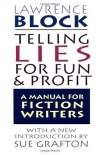Manual For Fiction Writers by Block, Lawrence (classic books to read .TXT) 📗

Book online «Manual For Fiction Writers by Block, Lawrence (classic books to read .TXT) 📗». Author Block, Lawrence
Chip Harrison's an eighteen-year-old kid who lives about a block away from his employer, private detective Leo Haig. Haig's a lifelong mystery fan who has always wanted to be Nero Wolfe. An uncle's legacy permitted Haig to set up shop upstairs of a Puerto Rican bordello in the top half of a carriage house in Chelsea, where he breeds tropical fish and tries to emulate his hero's eccentricity and acuteness. Chip runs around in a state of perpetual lecherous innocence, helping Haig solve such classic crimes as present themselves.
Martin H. Ehrengraf is a diminutive criminal lawyer with a passion for poetry and a dandy's attention to the niceties of dress. He keeps himself immaculate, although his office is generally in disarray. Ehrengraf is unique in that he handles criminal cases on a contingency basis, collecting fees only when his clients are acquitted or otherwise released. He rarely appears in court, operating behind the scenes to get his clients off the hook?and doing so by fabricating evidence, framing other persons, committing murders of his own, and otherwise launching end runs around the long arm of the law. Ehrengraf's home base is unspecified, but an astute reader might identify the city as Buffalo.
You won't find him in the Buffalo telephone directory, however, nor will you be able to locate any of the other four chaps in the New York phone book. They are all series characters of mine. Tanner has appeared in seven novels, Bernie Rhodenbarr in three, Chip Harrison in four. There have been three novels and two novelettes about Scudder, while Ehrengraf has been the subject of half a dozen short stories.
All five of them are exceedingly real to me. Some of them are less active than others, to be sure. It's been more than a decade since I wrote a word about Tanner, and several years since the most recent appearance of Chip Harrison. This hasn't diminished their reality in my eyes. I may not know precisely what they look like, and certain aspects of their backgrounds may be somewhat unclear. I may or may not write about any or all of them again. That's all beside the point. These gentlemen have played a predominant role, not only in my literary career but in the continuing evolution of my consciousness. They have been, and continue to be, a part of my life. They have evolved and grown and changed and defined themselves upon the printed page even as I have done likewise in what we presumptuously call the real world. If they are aspects of me, so too have they become parts of me.
The creation of a series character was an early ambition of mine. Once I passed the stage of merely wanting to write some indefinable great book and developed specific auctorial aims, I recognized the desire to create an enduring character and write voluminously about him.
Part of this urge stemmed from the amateur's conviction that there's an easy way to literary success. A great many non-writers tend to make this assumption. Once you've got a formula, I suppose you've got it made, no end of people have said to me, the envy unmistakable in their tone. It strikes me that they've made two false assumptions?(1) that I've got a formula and (2) that I've got it made. Wrong and wrong. (As we'll see later, once I do have a formula I'm likely to be in Deep Trouble.)
Akin to the nonsense about formula, these same non-writers assume that the development of a series character is a major step toward success, financial security, and a final solution to the heartbreak of psoriasis. Once you've got a character, they say, all you have to do is write about him for the rest of your life.
Terrific. Once you've got a pair of running shoes, all you have to do is leg it from Hopkinton to Boston. Once you've learned the Australian crawl, all you have to do is swim the Channel. Once you've hit puberty?oh, never mind.
More to the point, I wanted to write about a series character because I enjoyed reading about other people's series characters. Once I had made the acquaintance of an attractive and compelling lead character, I wanted to meet him again and learn more about him. If his world view was one I found interesting and illuminating, I wanted to see more of the world through his eyes.
This ambition notwithstanding, it wasn't until I'd been writing professionally for seven or eight years that I first created a series character. I did attempt to carry over one Ed London, the detective narrator of Death Pulls a Doublecross, and I faintly recall writing one or perhaps two magazine novelettes about him. But I never did get the handle on a second Ed London novel, and I think that's just as well. London wasn't much of a character, and in many respects I wasn't much of a writer. I could keep stories moving and my prose and dialogue





Comments (0)